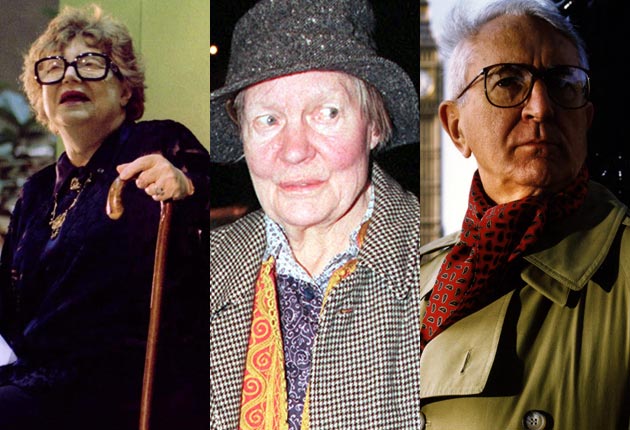Judges to name winner of 'lost' Booker Prize
Forty years on, 22 writers are shortlisted for award that never took place

Your support helps us to tell the story
From reproductive rights to climate change to Big Tech, The Independent is on the ground when the story is developing. Whether it's investigating the financials of Elon Musk's pro-Trump PAC or producing our latest documentary, 'The A Word', which shines a light on the American women fighting for reproductive rights, we know how important it is to parse out the facts from the messaging.
At such a critical moment in US history, we need reporters on the ground. Your donation allows us to keep sending journalists to speak to both sides of the story.
The Independent is trusted by Americans across the entire political spectrum. And unlike many other quality news outlets, we choose not to lock Americans out of our reporting and analysis with paywalls. We believe quality journalism should be available to everyone, paid for by those who can afford it.
Your support makes all the difference.They are 22 writers who could not be more different. Half are dead, one was a Nobel prize winner, some have joined the literary canon and a smattering have wilted into near obscurity.
What unites this disparate bunch of Commonwealth and Irish writers is the fact that they all published an acclaimed novel in 1970, the year in which the Man Booker prize did not run.
Now, 40 years later, Man Booker judges are righting that wrong. They have drawn up a long-list of writers, revealed today, 11 of whom have since died. Judges will shortlist the writers in March and will announce in May the "lost" Booker victor of 1970. The winner will be decided by the international reading public by lodging a vote on the Man Booker Prize website. The winner, or the winner's nearest relative, will be given a bound copy of the winning book.
The list includes some authors who have been recognised by Booker in other years. The late JG Farrell's The Siege of Krishnapur won the prize in 1973; Iris Murdoch, who died in 1999, and won with The Sea, The Sea in 1978 and was shortlisted in four other years; David Lodge, who was shortlisted in 1984 and 1988 and chaired the prize in 1989; the late Muriel Spark, who was shortlisted in 1969 for her novel The Public Image and in 1981 for Loitering with Intent; Nina Bawden whose Circles of Deceit was shortlisted in 1987; and Susan Hill, whose The Bird of the Night was shortlisted in 1972 and who judged the 1975 prize. Shirley Hazzard's The Great Fire, which took 20 years to write, was longlisted by Man Booker judges in 2004.
Other selections include Patrick White, who died in 1990 and who won the Nobel Prize for Literature in 1973, and the playwright, Joe Orton, who wrote only three novels, and whose Head to Toe was published posthumously. Among the living authors on the list are Melvyn Bragg, for A Place in England, the second part of his Cumbrian Trilogy which dramatises the life of a labourer and footman from the 1920s to 1960s, and the poet Elaine Feinstein.
The idea for the prize arose after the literary agent, Peter Straus, who is also an archivist to the Booker Prize Foundation, realised no prize had been awarded in 1970, a fact that had been long forgotten. The reason for this was that in 1971, two years after its inaugural year, the Booker ceased awarding retrospectively and became, as it is today, a prize for the best novel in the year of publication.
At the same time, the date on which the award was announced moved from April to November. As a result of these changes, there was a whole year's gap when, according to judges, a wealth of fiction fell through the Booker's net.
"I am delighted that, even in a Darwinian way, this year [1970], with so many extraordinary novels, can now be covered by the Man Booker Prize," Mr Straus said.
Ion Trewin, the literary director of Man Booker prizes, commented that while the absence of the award passed virtually unnoticed in 1970, there would nowadays be outrage from authors if such an omission were repeated.
He said the winning book may well add 100,000 to its sales, thanks to the "Booker effect", which was particularly pronounced last year when Hilary Mantel's winning book, Wolf Hall, sold 250,000 copies in the 11 weeks between her triumph on 7 October and Christmas Eve.
What was remarkable, he added, was the variety of books on the list, including "genre" books such as Len Deighton's spy thriller Bomber and Ruth Rendell's crime fiction, A Guilty Thing Surprised, which may not have been deemed sufficiently literary to have been nominated in 1970. All of the books had stood the test of time,Mr Trewin argued. "To look back and pick out books from the past is quite a good test of their worth," he said. "The fact is, we're still reading these books because they're still selling."
Also long-listed is Patrick O'Brian for Master and Commander, the first of his Aubrey-Maturin series set during the Napoleonic Wars chronicling the endeavours of Captain Jack Aubrey and the naval surgeon Stephen Maturin. HE Bates, the creator of The Darling Buds of May, is on the list for A Little of What You Fancy.
And Christy Brown, who suffered from cerebral palsy and wrote the autobiography My Left Foot – on which the award-winning film was based – is on the list for Down All the Days, a book which was the subject of a tribute song by The Pogues on their 1989 album Peace and Love.
Join our commenting forum
Join thought-provoking conversations, follow other Independent readers and see their replies
Comments